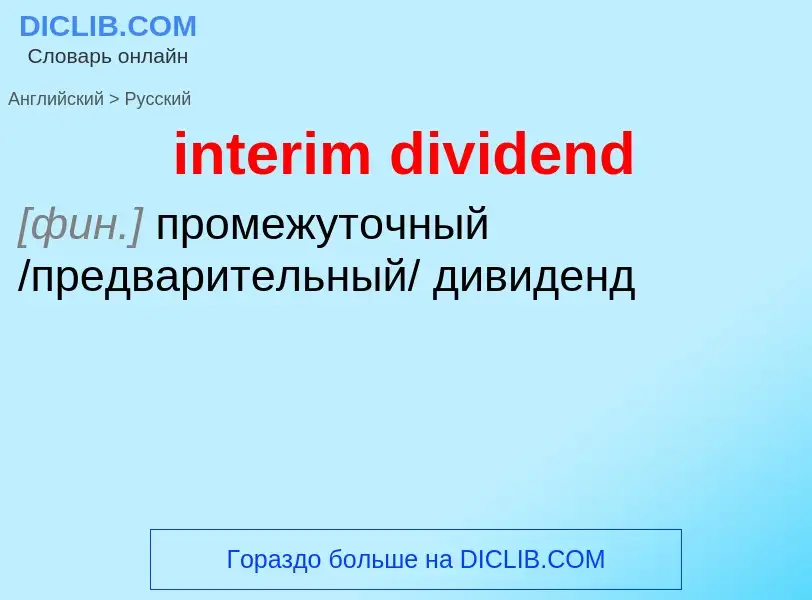Μετάφραση και ανάλυση λέξεων από την τεχνητή νοημοσύνη ChatGPT
Σε αυτήν τη σελίδα μπορείτε να λάβετε μια λεπτομερή ανάλυση μιας λέξης ή μιας φράσης, η οποία δημιουργήθηκε χρησιμοποιώντας το ChatGPT, την καλύτερη τεχνολογία τεχνητής νοημοσύνης μέχρι σήμερα:
- πώς χρησιμοποιείται η λέξη
- συχνότητα χρήσης
- χρησιμοποιείται πιο συχνά στον προφορικό ή γραπτό λόγο
- επιλογές μετάφρασης λέξεων
- παραδείγματα χρήσης (πολλές φράσεις με μετάφραση)
- ετυμολογία
interim dividend - translation to ρωσικά
[,ɪntərɪm'dɪvɪdend]
общая лексика
предварительный дивиденд (распределяется акционерным обществом до конца финансового года)
Βικιπαίδεια

A dividend is a distribution of profits by a corporation to its shareholders. When a corporation earns a profit or surplus, it is able to pay a portion of the profit as a dividend to shareholders. Any amount not distributed is taken to be re-invested in the business (called retained earnings). The current year profit as well as the retained earnings of previous years are available for distribution; a corporation is usually prohibited from paying a dividend out of its capital. Distribution to shareholders may be in cash (usually a deposit into a bank account) or, if the corporation has a dividend reinvestment plan, the amount can be paid by the issue of further shares or by share repurchase. In some cases, the distribution may be of assets.
The dividend received by a shareholder is income of the shareholder and may be subject to income tax (see dividend tax). The tax treatment of this income varies considerably between jurisdictions. The corporation does not receive a tax deduction for the dividends it pays.
A dividend is allocated as a fixed amount per share, with shareholders receiving a dividend in proportion to their shareholding. Dividends can provide stable income and raise morale among shareholders. For the joint-stock company, paying dividends is not an expense; rather, it is the division of after-tax profits among shareholders. Retained earnings (profits that have not been distributed as dividends) are shown in the shareholders' equity section on the company's balance sheet – the same as its issued share capital. Public companies usually pay dividends on a fixed schedule, but may declare a dividend at any time, sometimes called a special dividend to distinguish it from the fixed schedule dividends. Cooperatives, on the other hand, allocate dividends according to members' activity, so their dividends are often considered to be a pre-tax expense.
The word "dividend" comes from the Latin word dividendum ("thing to be divided").



